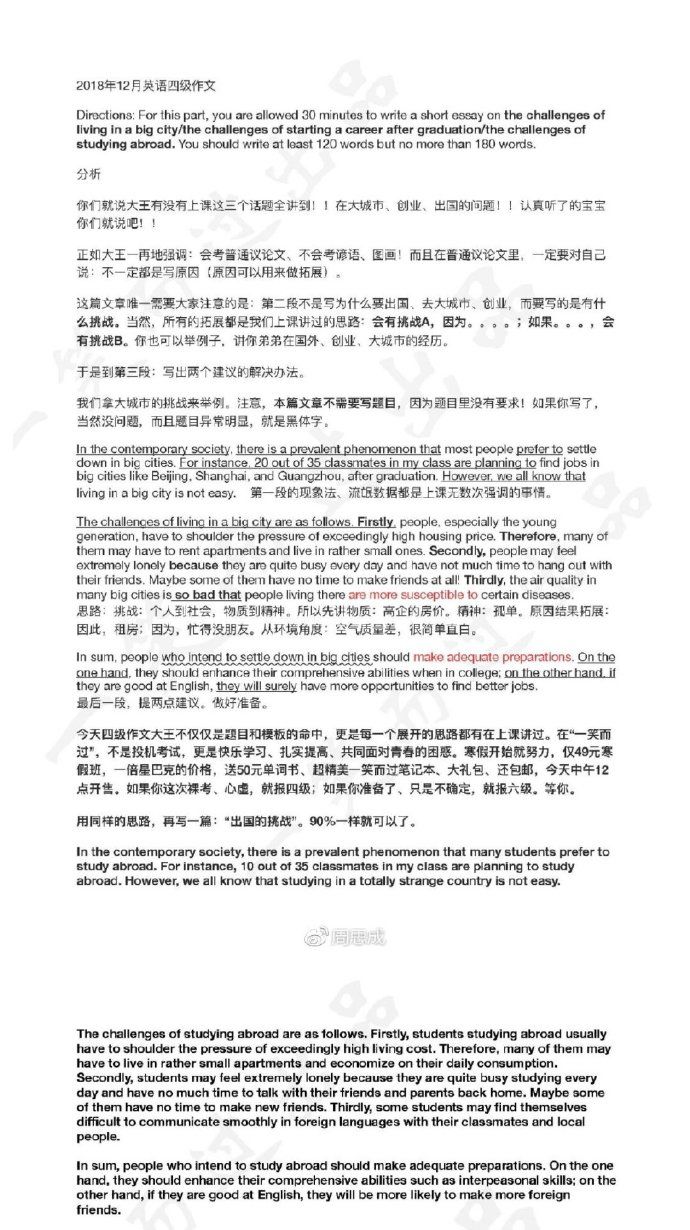|
4. 省略
1) 在以as, than, when, if, unless等引导的从句中的省略: 在有些状语从句中,如果谓语包含有动词be,主语又和主句的主语一致a),或者主语是it b),就常常可以把从句中的主语和谓语的一部分(特别是动词be)省略掉.
a) Look out for cars when crossing the street.
When taken according to the directions, the drug has no side effects.
While there he joined in voluntary labour on a project.
Although not yet six months old, she was able to walk without support.
If not well managed, irrigation can be harmful.
Though reduced in numbers, they gained in fighting capacity.
This viewpoint, however understandable, is wrong.
Enemies, once discovered, were tightly encircled and completely wiped out.
She hurriedly left the room as though/if angry.
She worked extremely hard though still rather poor in health.
Fill in the application as instructed.
Whenever known, such facts should be reported.
The documents will be returned as soon as signed.
He said that no acrobat could ever perform those daring feats unless trained very young.
Once having made a promise, you should keep it.
b) If necessary I’ll have the letter duplicated.
Fill in the blanks with articles where(ver) necessary.
If possible, I should like to have two copies of it.
As scheduled, they met on January 20 at the Chinese Embassy.
2) 在以than a) 或 as b) 引起的从句中,常会有一些成分省略.
a) He told me not to use more material than (it is) necessary.
We should think more of the collective than of ourselves. b) They worked with as much enthusiasm as young people (did).
He is now a vice-manager, but still often works in the kitchen as before.
Their training is free, as is all education.
We will, as always, stand on your side. 3) 错误的省略
His life is as fully committed to books as anyone I know.
While standing there in her nightgown, two bullets struck the wall beside her. 5. 一致
1) 如果主语是单数,尽管后面跟有with, together with, as well as, as much as, no less than, more than等引导的短语,谓语动词仍旧用单数形式.
Terry, along with her friend, goes skating every Saturday.
An expert, together with some assistants, was sent to help in this work.
The captain, as well as the coaches, was disappointed in the team. 2) 代词作主语时的一致
a) each, either, neither和由some, any, no, every构成的复合代词,都作单数看待.
Each of us has something to say.
Is everybody ready?
Somebody is using the phone.
Neither of us has gone through regular training.
Has either of them told you? b) some, few, both, many 等作复数 c) some 可后接复数,也可接单数,表示某一.
none作复数看待时较多,但也有时作单数看待,主要看说话人脑中联系想到的是复数还是单数概念, 但none 在代表不可数的东西时总是看作单数:
None of the books are easy enough for us
None of us seem to have thought of it.
None (= not a single one) of us has got a camera.
None (= nobody) has felt it more keenly than she did.
None of this worries me.
all 和most 可后接复数,也可接不可数名词 (all of the…, most of the …), 动词用单数.
3) 由and 或 both… and 连接名词词组时, 后用复数; 由not only…but (also), either…or, neither…nor或 or 连接的并列主语, 谓语通常和最邻近的主语一致.
Not only the switches but also the old writing has been changed.
My sister or my brother is likely to be at home.
Either you or Mr Yang is to do the work.
Neither my wife nor I myself am able to persuade my daughter to change her mind. 如果一个句子是由there 或here引导, 而主语又不止一个, 谓语通常也和最邻近的那个主语一致.
There was carved in the board a dragon and a phoenix.
Here is a pen, a few envelopes and some paper for you. | 







